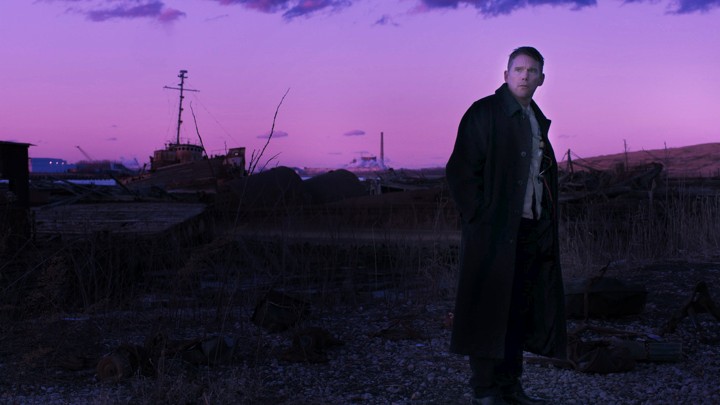[Cross-posted to In Medias Res]
Paul Schrader, the famed screenwriter and director, does not make subtle films. His latest movie, First Reformed–the story of a depressed, emotionally exhausted, and ultimately suicidal minister (played by Ethan Hawke), a man haunted his failed marriage, his dead son, his collapsing health, and an overbearing sense of guilt–is very much in line with the rest of Schrader’s work. Artists, in his view, should want to “cleave a crevice in the viewer’s skull that they have to somehow close“; in this regard (if not in all others), First Reformed succeeds.
The tool which Schrader uses to open up the viewer’s skull in First Reformed is essentially the same one which finally drives Hawke’s Reverend Toller, a former military chaplain whose son died in Iraq, over the edge: the question of whether God can (or will) forgive His creation for the immensity of the environmental harm it has done to itself, and the worry, or perhaps fear, over what struggling with that question honestly will mean for ourselves. For someone already as psychologically unbalanced as Reverend Toller–as the complacent but basically decent-hearted mega-church pastor who watches over Toller at one point comments, Toller, unlike Jesus, spends all his time in the Garden of Gethsemane–it meant a descent into jihadist madness. One would hope that would not be case for most of us. But struggle with it we must, however much that cranial opening in our perspectives pains us.
This is not, incidentally, merely a question for those who believe in a loving God who orchestrated our creation. Those who continue to insist that the Intergovernmental Panel on Climate Change’s desperate warnings about the need to contain global warming to 1.5°C is just Soros-backed nonsense, or that the overwhelming scientific consensus on the terrible threat of anthropogenic climate change is merely an example of paranoid groupthink, or that we’re on the cusp of a providential cornucopia of food production once the tundra in Siberia finally all melts, can, of course, continue to believe whatever foolish thing they want (and can save themselves the effort of reading the rest of this essay). But increasingly, the crushing reality of increasing ocean temperatures, extreme weather events, drought-driven refugee crises, and species collapse is forcing most of us to wonder how to navigate this human-made enormity, whether religious believers or not. Just this week, Noah Millman commented in The Week that “the most inconvenient truth of all” about climate change is the realization that we have “no mode of living that allows us simply to exist within an environment in a natural fashion, no spiritual road back to a prelapsarian state,” and Jonathan Frazen commented in The New Yorker that we must “accept that disaster is coming, and begin to rethink what it means to have hope.” Their counsel that we must find new ways to orient ourselves and our posterity towards what lays ahead of us, despite the immense difficulties which will almost certainly attend that future, is refreshingly honest. The near-simultaneous appearance of their essays, along with my watching of First Reformed, made a perfect complement to Noah J. Toly’s The Gardeners’ Dirty Hands: Environmental Politics and Christian Ethics, an unexpectedly deep work of political and theological reflection that I had just finished. An almost providential coincidence of influences, one might say.
I call Toly’s book “unexpectedly deep” because, in working my way through it, I did not at first suspect the stakes that Toly was aiming for. His work in environmental politics is important, but not, I thought, the stuff out of which grand theological insights are made. I confess that “ethics” as a discipline does not, for the most part, impress me; it too often, in my observation, gets taught and deployed in the context of already established secular and capitalist practices, and thus usually targets individual practitioners, not the structures of the practice itself. So while I enjoyed his reflections on Malthusianism, his unpacking of the “IPAT” (“Environmental Impact = Population x Affluence x Technology”) formulation, and his invocations of Herman Daly and other environmental thinkers who have developed much needed steady-state or slow-growth economic models, I didn’t find the book’s argument remotely radical enough to be truly engaging. (For whatever it’s worth, I teach Daly and similar thinkers as well, but at the present moment it is, frankly, “degrowth,” rather than slow-growth, that we really need.)
But beginning with chapter 3, which starts with a brilliant consideration of the 2010 Deepwater Horizon oil spill disaster in conjunction with the disasters experienced by the village of Macondo in Gabriel García Márquez’s famed One Hundred Years of Solitude, Toly moves in the direction of describing what he calls the “magical realism of climate change.” His point is that, unlike every other environmental concern we might face–urban brownfields, polluted rivers, deforestation, etc.–climate disruption is a phenomenon whose structural causes are fundamentally interpolated with the structures of human choices; as he pithily puts it, “climate change originates with the tragic or, more specifically, with attempts to overcome it” (p. 61). As modernity–and, most relevantly, the hydrocarbon-focused “paleotechnic energy regime” of the industrial and post-industrial world–constructed and repeatedly reconstructed itself around the transcending of various ecological and sociological limits, it exposed new limits to the world that would not have been known otherwise. Following a thoughtful review of the relevant science, Toly observes: “What this means is that climate change embodies the tragic dimension of environmental challenges not only because it requires us to navigate tradeoffs and instabilities now, but because the social systems that have fueled the problem were originally generated by impulses to address limitations” (p. 63). Or as he puts it at length at the end of the chapter:
Among other things, climate change is slowly undoing our ability to ignore or deny the tragic structure of the human condition. Perhaps more than any other issue, climate change has exposed the tragic foundations of environmental challenges, the ineluctable guilt that attends acting on those challenges, and the temptations to denial, paralysis, nihilism, and moral skepticism that attend those challenges. Reckoning honestly with climate change, and with the challenge of climate governance, shatters the illusion of a tragedy-free existence, highlighting what we might describe as the enduring tragic climate of environmental politics. (p. 79)
To speak as a Christian, I agree fully with Toly’s insistence that recovery of the sense of tragic, or in other words of limits, is essential to any appreciation of those goods which come to us as grace, as abundance. Without a consciousness of what we cannot do, or of what our doing cannot avoid necessarily implicating us also in so doing, then there can be no consciousness of that good which is beyond our doing. This confronts us with problems of agency and sin, of course. Early in the book, Toly commented that “‘the tragic’ in this sense is neither sinful nor the result of sin”–and I took issue with that. If sin is understood as the absence of, or the state of acting against, God’s good will, then how could something experienced as tragedy not be tied up with sin? But later Toly’s arguments led me to reconsider the meaning of his words–that is, perhaps we should understand the environmental tragedy of the entwining of human innovation and destruction, and the tragedy of the tradeoffs it forces upon us, as reflections of a “benign alienation.” That alienation–for those who accept the Fall, anyway–is both what introduced the possibility of and what contributes to the continuation of sinful acts, of course, most particularly against the natural creation which the Genesis story tells us we were given some stewardship over. But it also–and here Toly draws upon the work of Albino Barrera–“draws us into to Christian discipleship,” making “our allocative choices, or our choices among competing goods when we cannot possibly secure all of them … an opportunity to be like God in choice and creativity…. Apprehending the tragic reminds us of the enduring goodness of a finite creation and reveals the goodness of our limitations, as well as the goodness of the plurality of potentially legitimate but still not self-justifying ways to respond to the tragic” (pp. 88-89).
Trusting in God’s grace in the midst of–indeed, actually though the medium of–our own alienation is a hard theological claim. Unfortunately, it was not the tendency of most American Christians in the 20th century to do political theology with the hardness of finitude, plurality, and tragedy in mind; Billy Graham, rather than Dietrich Bonhoeffer (on whom Toly relies extensively) was our collective preference. Too many of us were captivated by the idols of efficiency, utility, and inevitability, seeing God’s will as, if not aligned with, than at least entirely orthogonal to industrial expansion. Of course technological progress and energy consumption must be unlimited; it’s impossible to imagine things otherwise, right? The human creature demands it! This is what Wendell Berry trenchantly called “an economic and technological determinism, as heartless as it is ignorant.” Toly invites us to realize how things can be otherwise. Not without painful tradeoffs, losses, and sacrifices, of course–but also not without hope for what he calls a “responsible Anthropocene.”
What will it look like? Toly doesn’t know. He gestures towards what geographer Doreen Massey calls “a politics of place beyond place,” which he reads, in light of the finite and alienated fact of our existence, a fact that obliges us to dig into particular places and tend to those possibilities of fecundity graced to us (a possibility which he ties to Biblical cities of refuge), “a politics of place” that also “sees its identity as constituted partly by relations with, impacts upon, and obligations to others beyond its borders.” As he concludes his book, “the gardener’s hands are dirtied by their bearing the costs for others … because facing the tragic responsibility means giving up, undermining, or destroying one or more goods [one might think here of our ever-responsive energy grids, our industrial food systems, our fossil fuel-dependent addictions to global travel, our too-casual involvements with exploitative supply chains around the globe, and more]… that others may benefit” (pp. 116-117).
One need not rely upon Christian theology to recognize the wisdom of this kind of chastened, resolute, localized hope. Jonathan Frazen, in the aforementioned essay, doesn’t advocate abandoning involvement with repairing or strengthening larger political and economic systems entirely–but he does center his own mostly (but perhaps not entirely) non-religious hopes on “smaller, more local battles….a community, an institution, a wild place, a species that’s in trouble,” so that he might “take heart in…small successes.” For him, it’s a community-supported agricultural operation that gives the urban homeless a chance to farm. Just more upper-class liberal do-gooding, some might sniff–but no one who takes both localism and the projections made by environmental science seriously, I think, can sniff at his final comments: “when the systems of industrial agriculture and global trade break down and homeless people outnumber people with homes….traditional local farming and strong communities will no longer just be liberal buzzwords. Kindness to neighbors and respect for the land–nurturing healthy soil, wisely managing water, caring for pollinators–will be essential in a crisis and in whatever society survives it.” Toly, I suspect, would fully agree.
The fictional Reverend Toller, when brought into confrontation with the limits of his ability to respond to the horror and confusion that climate disruption is bringing into all of our lives, thought God was calling him to violently embrace the blackness around him. Toly’s work helps us, believers and non-believers alike, to articulate a more hopeful response. It is not a recipe for something that our own contradictions ought to warn us away from, but rather a recommendation for a hope which can co-exist with tragedy, a hope for endurance and grace as we do the hard, difficult work which this planet we have changed calls us to. Not a bad challenge, that.








5 comments
Brian
I think Ecclesiastes 1:9 pretty much sums up everything about writing on this issue, for the past 30+ years.
I for one think it is a good and clarifying thing if environmental apocalypticism is viewed as an eschatological issue. I can then safely give it as much attention as I give other religions to which I am not an adherent.
Dan Grubbs
Man’s abuse of God’s creation is seen in Biblical accounts if we look carefully. If we consider what has happened since Gen. 2:8 and 2:15, we can tease out what creation is for and its characteristics. If creation, as I believe, was created for healthful human habitation (its characteristics) and to point mankind to worship of the most high God (its purpose), then any human-related activity that alters either the characteristics or the purpose is desecration.
No amount of technological or economic rationalization can validate desecration of creation. As provision for mankind, we are called to be obedient stewards of creation. Or, as Prof. Ellen Davis coins it, we must execute “skillful mastery” of God’s provision. I term this mandate stewardculture, but that discussion is for another time.
God created creation in such a way, with such integrated and complex systems, to not only provide for mankind, but to do so abundantly and to remove obstacles to man’s worship of Him. What we have done with the gift of creation is a continuing sad saga of our failure to have faith in God and His provision. I’m not saying because of our sin God punishes us with ecological destruction. I’m saying that our own appropriation of creation has had direct and corollary effects that are detrimental, whether they are felt immediately or in subsequent generations.
Due to avarice, I don’t believe any large-scale solution will present itself short of eschatological events. In the meantime, will small-scale solutions present themselves on local levels that allow pockets of people to live in peace? For a time, I believe they might. However, I doubt these pockets will be allowed to continue blissfully once we reach crisis levels when authorities or marauders will usurp those enclaves.
In short, the upheavals of environmental crisis can be viewed as a need for repentance and returning to trust in the One who called creatio ex nihilo into existence to point to His loving Self.
NOYB
Apparently if you sit on the front porch, you can’t see the science for the politics. Climate change happens. Humans are not the only, or even PRIMARY, cause of this change. The IPCC reports don’t even say what you say they say — and the climate doomsters are generally either misrepresenting the science, or relying on total junk “science.”
I’m done with FPR’s hyperventilating. There’s plenty of other things to read that aren’t left-wing rags stuff with nonsense.
Russell Arben Fox
The IPCC reports don’t even say what you say they say
Um, yeah, it actually kind of does. Maybe you should read it sometime. But thank you for doing as I recommended and giving up on the essay once you got to the third paragraph.
Nicholas Skiles
I’m mostly amused by the idea the FPR is a”left-wing rag.” If the only markers of conservatism are climate change denial and the embrace of unbridled capital, sure. The average American conservative seems interested in conserving little except their own complacency. If anything, many of the writers here embody what I’ve been calling the “alternative center.” Not a wishy-washy moderate, “let’s all compromise and get along” center. But a creative embrace of neglected thinkers from both ends of the political spectrum. If you can read Liz Bruenig or Gracy Olmstead and find yourself nodding agreement, you’re on the right porch. Those who would rather wheeze about Trump or Clinton can kindly get off my lawn.
Comments are closed.